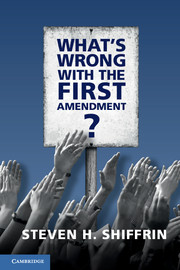4 - Sex
from PART I
Published online by Cambridge University Press: 05 September 2016
Summary
Like racist speech, pornography is incompatible with the nation's commitment to equal citizenship. In addition to attacking persons on the basis of an irrelevant characteristic, pornography makes the subordinate status of women sexually attractive. Indeed, it erotizes the domination of women including violence against women. In short, the First Amendment protects a billion dollar industry glorifying and sexualizing the subordination of women. This protection is inconsistent with the kind of public culture a just society needs to foster if it is to maintain a semblance of legitimacy. Here too, it should not be surprising that pornography causes violence and discrimination against women. When pornography becomes a significant form of sex education and sexual pleasure for men, it follows that many men will regard women primarily as sex objects and seek to enjoy their pornographic fantasies in actual encounters with women. The courts have yet to provide an adequate explanation as to why this harmful speech should be tolerated, let alone constitutionally protected.
A particularly important pornography case concerns an Indianapolis antipornography ordinance that was drafted by Andrea Dworkin and Catharine MacKinnon. The Indianapolis ordinance defined pornography to include the “graphic sexually explicit subordination of women through pictures and/or words that also includes” one or more types of depictions thought to be particularly problematic such as women being “presented as sexual objects who enjoy pain or humiliation” or “experience sexual pleasure in being raped”; women presented as “sexual objects tied up or cut up or mutilated or bruised or physically hurt, or as dismembered or truncated or fragmented or severed into body parts”; “presented in scenarios of degradation, injury, abasement, torture, shown as filthy or inferior, bleeding, bruised or hurt in a context that makes these conditions sexual.” The ordinance included other examples (some too far reaching in my view), but the common theme of the examples was that it sought to prevent the eroticization of sexual domination particularly, but not exclusively, when that domination took a violent form.
A similar ordinance had been proposed and debated in Minneapolis. In support of the ordinance, as Paul Brest and Ann Vandenberg report, many women testified that they had been forced by men to submit to degrading and painful scenarios taken from pornographic films and magazines. For example, one woman testified that she was seen walking in the woods by three deer hunters who were reading pornographic magazines.
- Type
- Chapter
- Information
- What's Wrong with the First Amendment , pp. 47 - 61Publisher: Cambridge University PressPrint publication year: 2016

